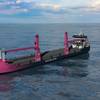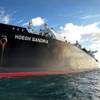Power Barges Bring New Light To Lagos
Sections of Lagos will receive an unprecedented 22 hours of electricity daily starting next month due to a project by U.S. energy group AES Corp, the head of Nigeria's state power company said. National Electric Power Authority (NEPA) managing director Joseph Makoju said in an interview the added power generated by AES Barge Nigeria Ltd, the Nigerian subsidiary of AES, will allow NEPA to supply power almost around-the-clock to Lagos' industrial area Ikeja beginning August 1.
Ikeja is home to Lagos state government buildings and companies. In June, the AES power-generating barges positioned next to the country's biggest power plant at Egbin near Lagos began injecting electricity into the national grid.
Businesses will have to pay a surcharge of 4.50 naira ($4) per kilowatt hour (pkwh) in Lagos, and eight naira pkwh ($7.15) in Abuja, on top of the five naira pkwh ($4.50) tariff they are currently paying.
"What we expect to offer is 24 hours everyday, but we don't want to push our luck too hard, so we are saying 22 hours for the surcharge to be effective," Makoju said.
In addition to the 270 MW AES generating barge project at Egbin, Makoju said a 15MW project would be built to generate emergency power for Abuja, Nigeria's capital.
"To be able to achieve this, we must have reserve capacity," Makoju said. "If our main supply (has) problems we can switch to the reserve capacity to maintain the guaranteed supply."
Makoju said 13 companies out of the 16 that saw the tariff proposal have agreed to join the scheme.
"Response in Abuja is very positive," Makoju said. "Now we are getting more applications and we are seriously considering expanding the project... it seems we can recover the investment if people are ready to pay that sort of surcharge."
Makoju said once the AES barges generate their full 270 MW (currently AES generates 60 MW), NEPA will pay 750 million naira ($6 million) per month. AES already plans to expand the barge project to generate 330 MW and it is also planning a 800 MW extension to a power plant in the oil-rich Delta state and a 548 MW power plant in Agbara, near Lagos.
NEPA has an installed capacity of 6,000 MW but is able to deliver barely a third of that, Makoju said. He said a recent survey showed Nigerian companies privately generate 3,000 MW because they can not rely on NEPA.









